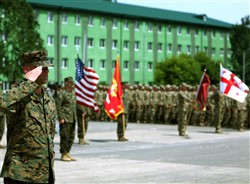This Week in EUCOM History: July 29 - Aug 4, 1975
Related Topics (4)
More related topics
August 1, 1975 -- The Helsinki Accords
Thirty-five nations, called together by the United States and the Soviet Union, begin a summit meeting in Helsinki, Finland, to discuss some pressing international issues. The meeting temporarily revived the spirit of detente between the United States and Russia.
By 1975, the policy of detente--the lessening of tensions between the United States and the Soviet Union--was slowly deteriorating. Richard Nixon, under whose administration detente began, had resigned from office in disgrace in August 1974. The collapse of South Vietnam in April 1975 left many Americans worried that the U.S. was losing the Cold War. In an effort to reawaken the policy of detente, President Gerald Ford and Secretary of State Henry Kissinger joined with the Soviet Union in calling for a multination summit in Helsinki in July 1975. Officially known as the Conference on Security and Cooperation in Europe, the meeting was attended by the United States, the Soviet Union, Canada, and all European nations (except Albania, which continued to plot its own very independent, and confusing, foreign policy). On August 1, 1975, the summit attendees issued the “Helsinki Accords” sometimes called “The Final Act” outlining the broad agreements that had been reached at the conference. All signatories to the Final Act agreed to respect the state boundaries established after World War II and abide by the rule of international law. In addition, human rights were emphasized and all states agreed to protect the basic rights of their people. Finally, all nations agreed to pursue arms reduction treaties in the future.
The agreements reached at Helsinki gave a temporary jumpstart to the idea of detente, but in the years to come most aspects of the Final Act were disregarded or forgotten. Although the Soviet Union agreed to respect human rights, it savagely attacked human rights groups in Russia (known informally as the "Helsinki groups"). And discussion about arms reduction treaties disappeared and was not revived until the mid-1980s. On a positive note, however, the Helsinki agreements did establish a foundation for more fruitful U.S.-Soviet relations in later years. President Ronald Reagan and Soviet leader Mikhail Gorbachev used the basic premises of the Final Act to pursue a number of diplomatic initiatives in the mid- and late-1980s, including dramatic breakthroughs in nuclear arms control.
Find more articles tagged with:
- Cold War
- Finland
- Mikhail Gorbachev
- partnership
- summit
- Russia
- Soviet Union
- President Richard Nixon
- President Ronald Reagan
- President Gerald Ford
-
This Week in EUCOM History: September 10-16, 1959
Nikita Khrushchev becomes the first Soviet head of state to visit the United States.Find more articles tagged with:
-
JMTC hosts CE participants for 3rd year
The Joint Multinational Training Command, or JMTC, here, is hosting more than 40 nations and multinational organizations participating in Combined Endeavor for the third year in a row.Find more articles tagged with:
-
Combined Endeavor 2012 welcomes 147 multinational distinguished visitors
Looking through the crowd of 147 multinational distinguished guests in their military uniforms and business suits, is difficult not to appreciate the level of commitment that each nation has made toward building partnerships.Find more articles tagged with:
-

81st FS plays critical role in NATO exercise
The 81st Fighter Squadron is participating in a Ramstein ROVER 2012 Sept. 5-22.Find more articles tagged with:
-

ILA 2012 features US military aircraft
More than 300 aircraft from about 50 different nations are on display this week at the Berlin Air Show, commonly know as ILA 2012.Find more articles tagged with:
-

German exchange pilot brings C-17 for the Berlin 2012 Air Show
As the Charleston based C-17 Globemaster III landed in Germany for the 2012 Berlin Air Show, one aircrew member brought with him a different set of experiences.Find more articles tagged with:
-

Multinational Medical Soldiers Strive for Elite Badge
Nerves and excitement ripple through the air here this week as multinational medical Soldiers from across Europe prepare to pass the tests for the prestigious Expert Field Medical Badge.Find more articles tagged with:
-

Combined Endeavor: Working together, developing solutions
Combined Endeavor 2012, or CE12, provides communications professionals the opportunities to work together and develop solutions while building relationships in a controlled environment.Find more articles tagged with:
-

Sailors protect CE12 participants
Sailors with Maritime Expeditionary Security Squadron Three provide security at Combined Endeavor 2012Find more articles tagged with:
-

Solving violent extremism takes many paths at DOD seminar
GARMISCH-PARTENKIRCHEN, Germany – In the course of exploring a definition and framework for “Countering Violent Extremism,” the 97 participants in a week-long seminar on the topic here have traveled down many paths.Find more articles tagged with:










Comments: 0